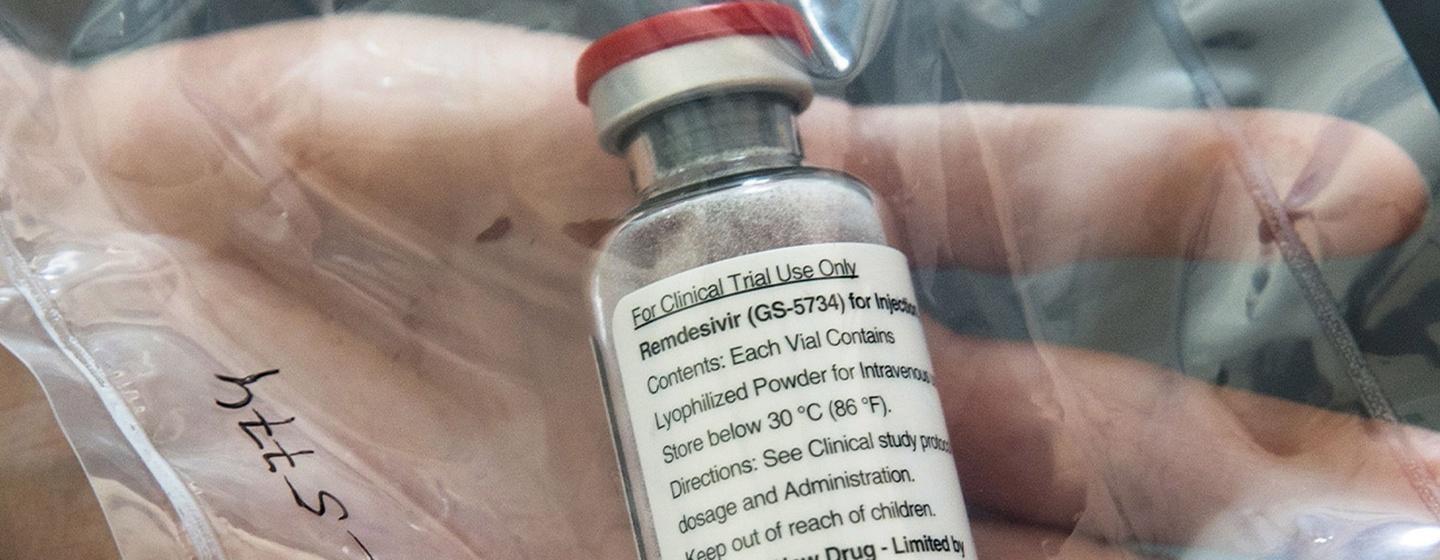Antiviral Drug Remdesivir Shortens Average Recovery Time for COVID-19 Patients


Coronavirus drug research out of UNC-Chapel Hill has garnered attention at the national level, most recently with President Trump receiving several doses of an experimental drug during his hospitalization due to COVID-19. The drug, an antiviral called remdesivir, has been shown to speed up the recovery time for patients with COVID-19 by suppressing the virus’ ability to reproduce.
News of the drug’s positive results in human clinical trials caused a surge of optimism in the stock market in April 2020 and Dr. Anthony Fauci, director of the National Institute of Allergy and Infectious Diseases and a member of the White House Coronavirus Task Force, said the results showed “quite good news.”
Gilead Sciences, the company that makes the drug, originally developed it to fight Ebola, without much success. But promising results in studies for the treatment of Middle East Respiratory Syndrome (MERS) and severe acute respiratory syndrome (SARS), which are also caused by coronaviruses, led researchers to investigate the effects of the drug on patients with COVID-19. These viruses use similar enzymes to replicate their RNA genomes and remdesivir targets those enzymes, interrupting the virus' ability to replicate.
The Baric Lab, led by Dr. Ralph Baric at UNC-CH, has studied coronavirus strains for more than 30 years and partnered with Gilead early in 2020 to test the drug. The study involved 1,063 hospitalized coronavirus patients around the world, 20 of which were located at Duke University Hospital. The patients received either remdesivir or a placebo for up to 10 days.
Results from this study were published in The New England Journal of Medicine on May 22, 2020 and showed that patients who received the drug recovered on average 4 days earlier than the patients who received a placebo. The results also show a small but not statistically significant decrease in patient mortality.
“This is a game changer for the treatment of patients with COVID-19,” Baric said in a statement. “Remdesivir provides an effective treatment strategy for the many infected individuals around the globe.”
Shortening recovery times is important for relieving the burden on hospitals, said Timothy Sheahan, assistant professor of epidemiology at the Gillings School and a researcher in the Baric Lab. “We have been working with Gilead for more than seven years to create broad-spectrum antiviral drugs that could be effective against multiple coronavirus strains and, hopefully, give us tools in the face of a pandemic. We were seeking ‘one drug for many bugs,’” he said in a statement.
Remdesivir is an experimental drug that has not yet been approved by the FDA for the treatment of any condition, but it is currently part of several clinical trials and it has being released in response to requests for "compassionate use" for patients with severe cases of COVID-19. The FDA has also granted remdesivir an Emergency Use Authorization (EUA) for the treatment of hospitalized patients with severe COVID-19.
One of the issues that has arisen when comparing promising lab results with the results of clinical trials with humans is the delay between when patients become infected with COVID-19 and when they start presenting symptoms. Dr. Marc Siegel, an associate professor of medicine at the George Washington University School of Medicine and Health Sciences suggested in an interview with Healthline that remdesivir is likely to be more effective when administered earlier in the progression of the virus.
“By the time people come into the ICU, the virus has often already come and gone,” Siegel said, “and it’s more the body’s immune response to the virus that’s doing the damage.”
Many experts agree that having access to remdesivir in the early stages of illness would increase the drugs effectiveness, but currently, remdesivir is only available as an IV drug, not an oral medication, and therefor must be administered in a hospital setting. Gilead Sciences is currently working on a more accessible version and according to their website, started investigating an inhaled version of remdesivir in August 2020. An inhaled formulation would be delivered through a nebulizer, which could potentially allow for easier administration outside the hospital, at earlier stages of COVID-19.
Designing, testing and scaling up production of a coronavirus vaccine could take a year to 18-months. In the meantime, drug companies and researchers are scrambling to find remedies that suppress the coronavirus, which has killed 200,000 people globally and 60,000 in the United States. Remdesivir is the first drug to show any success against coronavirus in a gold-standard, randomized controlled study.